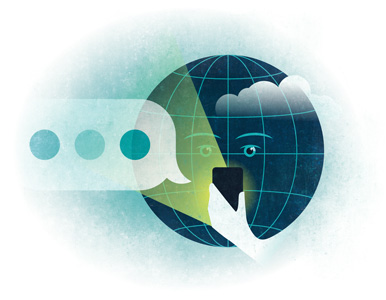
You can send one 280-character text message to every phone in the world. What does it say?
Every country has dangerous people, but only America lets them have personal arsenals. The gun violence epidemic kills 100 people per day and injures more than 200 others, making us a nation of survivors. But we don’t have to live or die this way. We have the power to make our communities safer. Join us in the fight to save lives.
Shannon Watts is founder of Moms Demand Action and a 2022 fellow at AU’s Sine Institute of Policy and Politics.
Truth matters, no matter the cost. Holding our elected leaders accountable with fact-based reporting has never been more important. Independent news coverage is the most relevant fabric to an informed global society. Trust journalism, trust reporters, speak out, and use your voice.
Antoine Sanfuentes, CAS/BA ’90, is vice president and managing editor of CNN’s Washington Bureau and an SOC distinguished guest lecturer.
For democracy to work for all of us, it must include all of us. To move forward together as a nation, we must ensure that every American has the freedom to vote so that in our elections, the will of the people prevails. #votingrightsnow
Zaria Guignard, SPA/BA ’20, SPA/MPA ’22, is a campaign associate with All Voting Is Local at the Leadership Conference on Civil and Human Rights.
I would like to amend “It takes a village to raise a child” to “It takes a community to end food insecurity.” We all know someone who has struggled to find the food they need to thrive, especially in this pandemic. Together we can take care of our neighbors and seek solutions that prevent food insecurity. How will you make a difference?
David Uhl, SPA/MPA ’09, is executive director of Feeding Washington.
Each community has a distinct set of problems created by unique circumstances, but also people uniquely equipped with the education, resources, and passion to solve them. Be a person who works to identify solutions to the problems in your community. We can all work to restore vitality and improve quality of life where we live.
Professor Brett Gilbert is the inaugural Kogod Regional Innovation Chair.
Live intentionally. Be a force for good. Be remembered as someone who made the world a little better, a little kinder, and a little more harmonious—and then be content to eventually be forgotten.
“There is need of a sound body, and even more of a sound mind. But above mind and above body stands character.” —Theodore Roosevelt
Jeff Rothenberg, Kogod/BSBA ’04, is vice president of development at the Theodore Roosevelt Presidential Library and Museum.
We do not have to be afraid of our differences or pretend that they do not exist. It is possible to be united, even when we are not the same. When we welcome newcomers and seek to understand and support them, it grows and strengthens us all.
Tessa Ambridge, SOE/MA ’09, is a volunteer at Upwardly Global and the RYSE Initiative and an ESL educator of more than 10 years, most recently with Northern Virginia Community College.
Close your eyes. Take a deep breath. You’re doing a good job. Hang in there and remember this: It will all be OK in the end. If it’s not OK, then it’s not the end.
Professor Cynthia Miller-Idriss is director of AU’s Polarization and Extremism Research and Innovation Lab and director of research at the Center for University Excellence.
Wherever you are, whatever you’re doing, stop. Look up. Climate change is here. Take 3 deep breaths. We need you.
Ask yourself: What are your strengths and how can you grow them? Who can you connect with to combine your strengths? What obstacles do you face and how can you overcome them together?
You can help build a more beautiful world.
Gabriel Dayley, SIS/MA ’16, is a climate protection program manager for Albemarle County, Virginia.